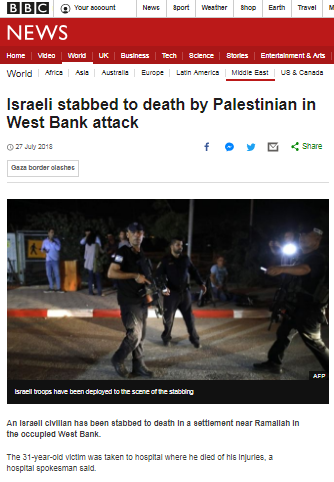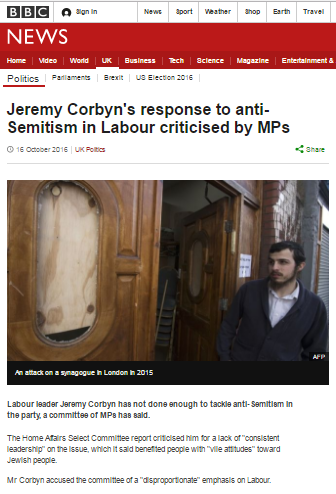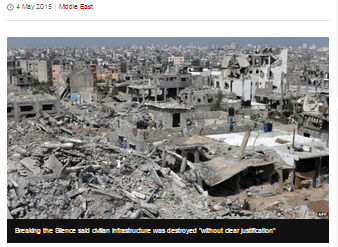On the evening of July 26th a terror attack took place in the community of Geva Binyamin (Adam), north of Jerusalem.
“The regional council spokesman said the terrorist climbed over Adam’s security fence. He then walked deeper into the settlement, crossing a playground area, where he encountered the 31-year-old resident, and stabbed him repeatedly in the upper torso. A second resident, the 58-year-old, came out of a nearby home and was also stabbed. A third resident, hearing the disturbance, went outside and, realizing that an attack was occurring, shot the Palestinian terrorist three times, killing him.”
Doctors were unable to save the life of the first victim, who was later named as Yotam Ovadia – a father of two young children.
Early on the morning of July 27th the BBC News website published a report titled “Israeli stabbed to death by Palestinian in West Bank attack” on its Middle East page.
As is inevitably the case in BBC reporting on terror attacks against Israelis (but not when reporting attacks in the UK or Europe), the BBC refrained from describing the attack as terrorism, with the only reference to terror coming in a direct quote from an Israeli official.
“An Israeli civilian has been stabbed to death in a settlement near Ramallah in the occupied West Bank.
The 31-year-old victim was taken to hospital where he died of his injuries, a hospital spokesman said.
Two other Israelis were wounded in the attack in Adam on Thursday. One, aged 50, is in a critical condition and the other suffered minor injuries.
The Israeli army says the attacker was shot and killed, reportedly by a civilian who was passing by.
It says troops will be sent to nearby Kubar village, where the 17-year-old Palestinian attacker is reported to have lived.
“The terrorist infiltrated the community of Adam, north of Jerusalem, and stabbed three civilians,” the army said in a statement. “Troops arrived at the scene and are searching the area.””
The BBC did not bother to update its article after the victim’s identity was made public.
Readers were also given the following piece of context-free information:
“Palestinian militant group Hamas said the attack was an act of heroism and revenge for three fighters who were killed in Gaza on Wednesday.”
The BBC however had not reported that previous incident, meaning that audiences were unaware of the fact that it began when:
“Soldiers patrolling the southern part of the Gaza Strip border came under fire Wednesday evening from a sniper within the Hamas-controlled territory, according to the IDF.
The Israeli military later said an officer was moderately wounded by the sniper fire. It said he was taken to Soroka Medical Center in the southern city of Beersheba for treatment.”
Neither do BBC audiences know that Hamas used a group of children to draw the patrol to the area.
“According to the IDF, the sniper fire came as a group of IDF soldiers arrived at a part of the fence that saw a group of 20 minors rioting on the other side. The minors were used as a decoy by the sniper to fire on the soldiers. […]
Military sources told Army Radio late Wednesday…that Hamas had encouraged the demonstration by young Gazans at the fence, drawing an IDF patrol, and then its snipers opened fire on the soldiers.”
Israel responded to the incident with strikes on Hamas military installations in which the members of the terror organisation described by the BBC as “three fighters” were killed. BBC audiences have also not been informed that during the same incident, terrorists in the Gaza Strip launched nine rockets at Israeli civilian communities.
The latter part of the report was given over to what was clearly intended to be background information. Despite the number of terror attacks having declined over the past year, the BBC told its audiences that:
“There has been a wave of stabbings, shootings and car-rammings of Israelis predominantly by Palestinians or Israeli Arabs since late 2015.
Dozens of Israelis have been killed in nearly three years of mainly lone-wolf attacks.
Some 300 Palestinians – most of them assailants, Israel says – have also been killed in that period, according to news agencies. Others have been killed in clashes with Israeli troops.” [emphasis added]
As we see, “in nearly three years” the BBC has still not bothered to independently confirm that information itself.
An old mantra was once again recycled:
“Israel says Palestinian incitement has fuelled the attacks. The Palestinian leadership has blamed frustration rooted in decades of Israeli occupation.”
It is worth remembering that since the surge in terror attacks began in late 2015, the BBC has consistently failed to provide its audiences with any serious reporting on the topic of incitement and glorification of terrorism by Palestinian officials. Readers are hence unable to judge for themselves whether or not what “Israel says” is accurate.
Likewise, it is noteworthy that the portrayal of terrorism as being attributable to “frustration rooted in decades of occupation” conforms to a guidance document for members of the international media put out by the PLO in November 2015.
The report closed with the BBC’s standard one-sided presentation of ‘international law’:
“More than 600,000 Jews live in about 140 settlements built since Israel’s 1967 occupation of the West Bank and East Jerusalem. The settlements are considered illegal under international law, though Israel disputes this.
There are also some 100 outposts – small settlements built without the government’s authorisation.”
Related Articles:
BBC News reports another fatal terror attack without the word terror
Quantifying BBC ‘due impartiality’ on ‘international law’




